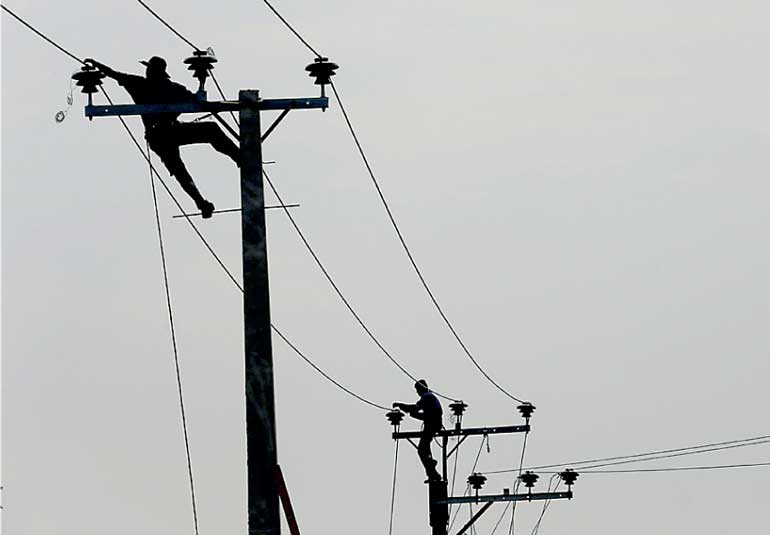Sunday Feb 22, 2026
Sunday Feb 22, 2026
Wednesday, 2 March 2022 00:00 - - {{hitsCtrl.values.hits}}

The COVID-inflicted economy got a fresh shock with the electricity regulator approving a debilitating seven-and-a-half power cut today, sparking anger within the private sector and the public.
Today’s power shedding approved to the Ceylon Electricity Board (CEB) is the longest, renewing fears that more power cuts are in the offing owing to continuous failure by the Government to resolve the foreign exchange crisis and the resultant energy supply fiasco.
As per today’s schedule approved by the Public Utilities Commission of Sri Lanka (PUCSL), there will be a five-hour power cut during the day and two-and-a-half hours at night.
“The Commission was reluctantly compelled to approve the Ceylon Electricity Board (CEB) request due to non-availability of fuel for the extended hours,” PUCSL Chairman Janaka Ratnayake said.
He also said that the load shedding for all areas will be five hours between 8 a.m. to 6 p.m., whilst the two-and-a-half hours between 6 p.m. to 11 p.m.
The private sector, already impacted by the forex crisis, is fuming over the power cuts and fuel shortage.
Sri Lanka Association of Manufacturers and Exporters of Rubber Products (SLAMERP) yesterday urged the Government to provide continuous power for export industry factories as the production is interrupted due to the current power cuts
“It is affecting both the BOI and non-BOI sector, and members are reporting production and supply chain disruption, the rubber sector is one of the industries which uses machinery that needs high capacity, uninterrupted electricity to run the production lines.
“Generators are not a practical way of running these machines as once disconnected, to restart such machinery; factories need to shut down production. This is affecting our overall production cycle and the export order process,” SLAMERP Director General Rohan Masakorala stated.
He said the country and the export sector cannot progress without stable energy and power supplies to key industries and services.
Tourism industry veteran Chandra Wickremesinghe said over the weekend many tourist vehicles were queuing up for long hours at petrol sheds after dropping their guests at the hotels. “If lucky they get to refuel, if not they are stranded,” he added.
He warned that the fuel shortage is impacting round-trip tourism. “Destinations such as Dambulla, Habarana, Kandy, Nuwara Eliya, Tissamaharama and Galle are popular points for refuelling for tourist vehicles. Therefore, we need to have a special mechanism for re-fuelling at these locations,” Wickremesinghe said.
According to him hoteliers are also having the same issue with power cuts and unable to operate their generators due to lack of diesel.
“These are serious issues. Tour operators and individual travellers will not be encouraged to use Sri Lanka as a holiday destination under these circumstances. If this is not arrested, we will not be able to cater to the growing demand of tourist arrivals,” Wickremesinghe warned.
Other hoteliers said diesel stored is diminishing fast and the industry will come to a grinding halt.
The BPO/KPO sector within the broader ICT industry is another casualty by the power cuts especially since most of the knowledge workers are operating from home and have no access to uninterrupted energy supply. “If not resolved, most of the KPOs/BPOs will shift their work elsewhere in the region,” they warned.
Public outcry against fuel shortage and power cuts is over pouring with passenger and goods transport impacted apart from those in self-employment especially three-wheel drivers.
The Rajapaksa administration is increasingly coming under Opposition fire for the failure to urgently resolve the energy crisis whilst criticism within the Government is also growing with some blaming the Central Bank for not releasing adequate foreign exchange to procure fuel but letting non-essential imports flood.
Energy Minister Udaya Gammanpila on Monday blamed the Government for getting priorities mixed up. “It is high time that the Government cuts down on unnecessary spending and prioritises its needs to manage the economy. Certain items like apples, grapes, and honey are imported, while essential items such as medicines and fuel are not,” he told journalists. It was pointed out that the country spent $ 21 billion on imports last year, of which the allocation for fuel was only $ 2.8 billion.
